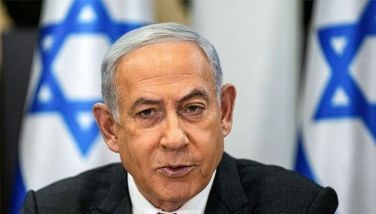Disputes cloud Asia-Pacific summit focus on trade
BALI, Indonesia (AP) — Asia-Pacific leaders vowed Tuesday to cooperate on stabilizing a global economic recovery threatened by resource scarcity and bottlenecks to growth.
Leaders of the 21-member Asia-Pacific Economic Cooperation forum wrapped up their annual summit with a pledge to protect security of food, energy and water from threats posed by climate change and population growth.
"As our region increasingly becomes the main engine of global growth, we are called by the duty to look ahead, to adapt to our changing needs, and to reinvigorate the path toward progress in the Asia-Pacific," the group said in its declaration.
It also pledged cooperation on improving infrastructure such as roads, bridges and ports to make the region seamless for commerce. Most of the APEC declaration was a reiteration of longstanding goals.
Also Tuesday, leaders of the dozen countries involved in U.S.-led free trade negotiations called the Trans-Pacific Partnership issued a statement saying they are on track to agree on a comprehensive deal before the year's end.
"It's an ambitious goal," said U.S. Trade Representative Michael Froman. "Ultimately the substance will drive the timetable. We're not going to agree to a bad deal for just the sake of meeting a deadline. But there's a lot of momentum."
Soured ties between China and Japan bubbled beneath the surface of the summit after Beijing was announced as the host of next year's meeting, putting renewed focus on the testy relationship between the two Asian powers.
The official agenda for the meeting was mainly about forging a consensus on freer trade, but in speeches and meetings, territorial tangles between China and most of its neighbors were a constant subtext.
The summit, held this year on the Indonesia resort island of Bali, gave regional leaders a chance to talk through issues in formal and informal settings. The grouping of nations and territories includes over 3 billion people and more than the half the world economy, ranging from tiny Brunei to powerhouses such as China, Japan and the U.S.
"The close collaboration will result in a win-win situation, especially at a time when the world economy has yet to fully recover," said Indonesia's President Susilo Bambang Yudhoyono in concluding the summit.
But the meetings did not result in any progress on a stalemate between China and Japan over disputed islands in the East China Sea.
Japan Prime Minister Shinzo Abe says the door is open to dialogue, but Tokyo is steadfastly refusing to discuss the conflicting claims over the uninhabited islands called the Senkakus in Japan and Diaoyus in China. With the two sides so far apart, the closest the two leaders may have gotten to speaking at APEC was a brief handshake.
China will host APEC's annual summit next year and many preliminary meetings before that. The recent souring of ties, which flared into anti-Japanese riots last year, prompted top Beijing officials to stay away from an annual meeting of the International Monetary Fund in Tokyo in 2012.
Japanese officials said they did not anticipate any problems with the APEC meeting in Beijing. But they were more forthcoming when asked about Chinese criticism of defense collaboration between Japan, Australia and the U.S.
"These three countries are not only bound by treaties, but these countries value openness and rules-based structures," said Tomohiko Taniguchi, a councillor in Abe's Cabinet. "We have to team up together to preserve the freedom of movement of goods in these public spaces."
Territorial disputes between Southeast Asia and China that center on Beijing's vast claims to the South China Sea were also under discussion.
The 10 members of the Association of Southeast Asia Nations hope to agree a common policy in handling territorial disputes, an aim backed by Japan. Beijing, in principle committed to it, says it is not in a hurry to quickly conclude the talks.
Philippine President Benigno Aquino III, speaking to Filipino journalists Monday evening, said there was some progress in talks between ASEAN and China toward drafting a code of conduct to govern how the parties solve territorial disputes.
"I am not saying that the signing of the Code of Conduct is near," Aquino said. "But to convince everyone to talk about — and it is really being discussed — I think is progress in finding a solution to the rift over sovereignty."
He said that after being on the backburner for 10 years, "the issue is now at the forefront of everyone's thinking."
As many in the region worry over mishaps that could trigger further conflict, both China and Japan sought in Bali to reassure their neighbors over their peaceful intentions — Japan because of its wartime past, China because of its growing assertiveness as a rising economic and military power.
Meetings between Abe and his Vietnamese and Indonesian counterparts touched on their disputes with China over islands and waters in the South China Sea, said Kuni Sato, press secretary at the Japanese Foreign Ministry.
- Latest
- Trending

































